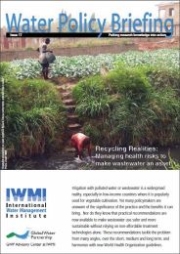Recycling Realities: Managing health risks to make wastewater an asset.
Citation:
International Water Management Institute (IWMI) 2006. Recycling realities: managing health risks to make wastewater an asset. Colombo, Sri Lanka: International Water Management Institute (IWMI) 6p. [IWMI Water Policy Briefing 17]
Abstract
This Water Policy Briefing was produced by IWMI in partnership with the Global Water Partnership (GWP) Advisory Center at IWMI and the GWP Technical Committee. It is based on the book Wastewater Use in Irrigated Agriculture: Confronting the Livelihood and Environmental Realities, edited by C.A. Scott, N.I. Faruqui, and L.Raschid-Sally (CABI/IWMI/IDRC, 2004), and the revised WHO Guidelines for the Safe Use of Wastewater, Excreta and Greywater (2006, In Press). The brief complements Catalyzing Change, the GWP handbook for developing IWRM and water efficiency strategies and plans, and the associated policy and technical briefs. In developing countries, fast-growing urban populations are demanding more fresh water and food, while generating greater volumes of domestic wastewater. Due to the lack of comprehensive wastewater management, a major portion of the wastewater pollutes natural water bodies. These polluted sources are used in and around the cities for agriculture and other purposes. In drier climates, farmers often use the wastewater itself from drains and sewers because it is the only (reliable) source of water. Although municipalities increasingly recognize the importance of this sector in supplying cities, amongs other things with vitamin rich vegetables, they are also aware of the associated health risks through microbial crop contamination1, especially when it concerns food consumed uncooked. Among wastewater-related infections, diarrhoeal diseases are the top cause of death among children in the developing world. Fragmented attempts have been made to address this problem, by relying on technical solutions (wastewater treatment) or regulatory measures (such as banning wastewater irrigation or restricting the types of crops irrigated). Both approaches have failed in the context of low-income countries. What’s required is an integrated water resources management (IWRM) approach which looks at the whole urban water cycle and across the urban-rural continuum at environmental consequences downstream, as well as socio-economic benefits of resource recovery. This has to be combined with locally appropriate and sustainable risk reduction measures. It should also recognize that solutions require the active involvement of stakeholders from different sectors. This is a vital point in a sensitive and multi-sectoral issue like peri-urban wastewater irrigation, which commonly concerns different ministries and municipal departments.


